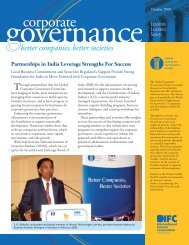A Self-Assessment Guide for Health Care Organizations - IFC
A Self-Assessment Guide for Health Care Organizations - IFC
A Self-Assessment Guide for Health Care Organizations - IFC
Create successful ePaper yourself
Turn your PDF publications into a flip-book with our unique Google optimized e-Paper software.
Standard EPR.6 [Reproductive health practices/IVF]<br />
The organization sets policies and oversees practices relating to fertility treatment.<br />
Intent of EPR.6<br />
<strong>Organizations</strong> providing fertility services develop and implement reproductive health policies <strong>for</strong> fertility treatment (e.g. IVF), which take<br />
account of legal, social and ethical considerations.<br />
IVF services raise many important ethical issues that should be addressed in the policies. For example:<br />
• When embryos are <strong>for</strong>med outside the body, what should be done with those that are not transferred<br />
––<br />
Is it acceptable to use them <strong>for</strong> research<br />
––<br />
Could they be donated to another infertile couple<br />
––<br />
Should they be frozen <strong>for</strong> future use Or should they be destroyed<br />
––<br />
And who has the right to make these decisions<br />
• Donation of gametes (egg and sperm)<br />
––<br />
What criteria are used to determine who may donate and who may receive gametes (e.g. age, relationship status, family size, etc)<br />
––<br />
What procedures are followed <strong>for</strong> recruiting, counseling and treating donors<br />
––<br />
What rules apply to the compensation of donors<br />
––<br />
What are the rules determining anonymity, or otherwise, of donors<br />
• Ethical questions concern the practice of transferring several embryos in order to increase the likelihood of pregnancy. (If all the embryos<br />
successfully implant, the woman faces the prospect of a high order multiple pregnancy, with its attendant increased risks of obstetric<br />
complications, premature birth and disability 12 ).<br />
Sex selection using IVF techniques presents a wide range of important ethical, legal and social implications. A significant ethical concern is<br />
that sex selection <strong>for</strong> non-medical reasons may rein<strong>for</strong>ce discrimination, particularly against women and girls. 13<br />
In<strong>for</strong>med consent by women <strong>for</strong> all reproductive services is required. Services are carried out based on standardized procedures by qualified<br />
practitioners. And, a registry is kept to track the outcomes.<br />
Measurable Element Look <strong>for</strong> Score Observations<br />
What is required<br />
1) Fertility treatment is<br />
integrated into a wider<br />
reproductive and child<br />
health package of<br />
services. 14<br />
How is this element<br />
assessed<br />
Fertility treatment is a part of the<br />
local maternal health scope of<br />
services.<br />
0 5 10 Why did you give this score<br />
........................................................<br />
........................................................<br />
2) The organization has<br />
written policies regarding<br />
assisted reproductive<br />
health technologies that<br />
ensure that the rights of<br />
women as users of these<br />
technologies are within the<br />
boundaries of legal and<br />
ethical considerations.<br />
Policies and procedures address<br />
assisted reproductive health<br />
technologies, including IVF. These<br />
should address key ethical issues<br />
(e.g. including those outlined<br />
above) – especially in countries<br />
where regulations are not<br />
well-defined.<br />
Policies must include the rights of<br />
women, including egg donors<br />
(where applicable).<br />
........................................................<br />
........................................................<br />
........................................................<br />
........................................................<br />
........................................................<br />
12<br />
WHO. (2003) Assisted reproduction in developing countries-facing up to the issues. Progress in Reproductive <strong>Health</strong> Research. No. 63. Available on:<br />
www.who.int/reproductive-health/hrp/progress/63/63.pdf<br />
13<br />
WHO Genomic Resource Center. Available at: www.who.int/genomics/gender/en/index4.html<br />
14<br />
See a discussion of policy regarding infertility treatment in India, available at: www.searo.who.int/LinkFiles/Reporductive_<strong>Health</strong>_Profile_infertility.pdf<br />
<strong>IFC</strong> <strong>Self</strong>-<strong>Assessment</strong> <strong>Guide</strong> <strong>for</strong> <strong>Health</strong> <strong>Care</strong> <strong>Organizations</strong> 33


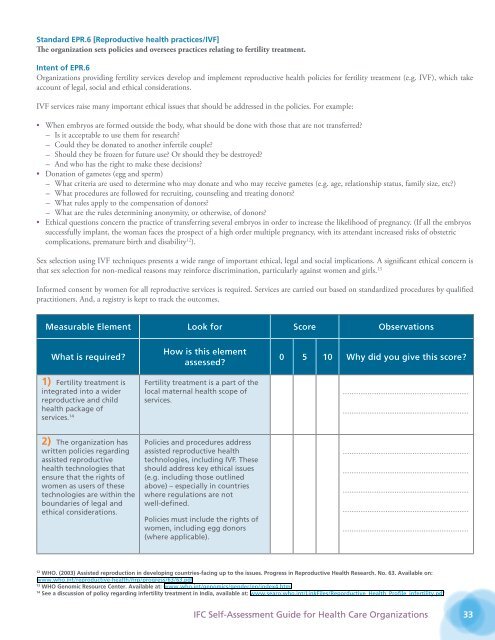
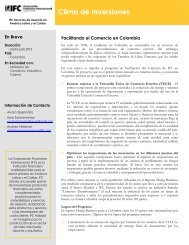
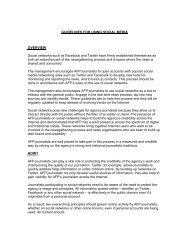
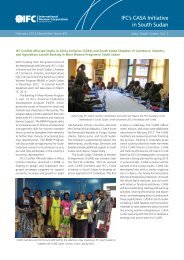
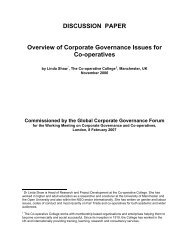
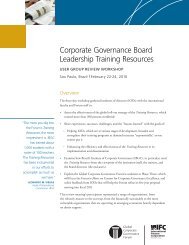

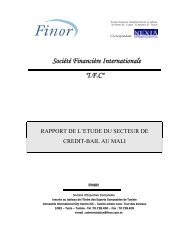


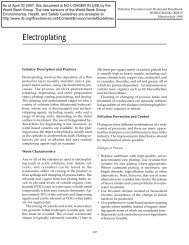

![Print a two-page fact sheet on this project [PDF] - IFC](https://img.yumpu.com/43449799/1/190x245/print-a-two-page-fact-sheet-on-this-project-pdf-ifc.jpg?quality=85)

